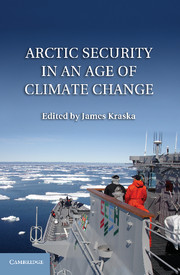Book contents
- Frontmatter
- Contents
- Figures and Tables
- Contributor Biographies
- Foreword
- Part I Introduction: Circumpolar Perspectives
- Part II European Security Interests in the Arctic
- 4 Arctic Security and Norway
- 5 Norway and the Arctic
- 6 Military Aspects of Russia's Arctic Policy
- 7 The Russian Arctic in the Twenty-First Century
- 8 The Rise of the Arctic on the Global Stage
- 9 The Arctic Challenge to Danish Foreign and Security Policy
- 10 Arctic Security
- 11 Territorial Discourses and Identity Politics
- Part III North American Security Interests in the Arctic
- Afterword
- Index
- References
7 - The Russian Arctic in the Twenty-First Century
Published online by Cambridge University Press: 07 September 2011
- Frontmatter
- Contents
- Figures and Tables
- Contributor Biographies
- Foreword
- Part I Introduction: Circumpolar Perspectives
- Part II European Security Interests in the Arctic
- 4 Arctic Security and Norway
- 5 Norway and the Arctic
- 6 Military Aspects of Russia's Arctic Policy
- 7 The Russian Arctic in the Twenty-First Century
- 8 The Rise of the Arctic on the Global Stage
- 9 The Arctic Challenge to Danish Foreign and Security Policy
- 10 Arctic Security
- 11 Territorial Discourses and Identity Politics
- Part III North American Security Interests in the Arctic
- Afterword
- Index
- References
Summary
In the summer of 2007, when the Russian flag was placed on the ocean floor at the North Pole and the Arctic ice cover receded to the lowest extent ever recorded, the media sought Arctic story lines that would grab the public's attention. Titles and headlines such as “Arctic Meltdown,” “A New Cold War,” and “Arctic Land Grab” focused on burgeoning Russian activities in the Arctic all fed a sense of circumpolar competition, conflict, and crisis.
These story lines were effective because they built on geopolitical beliefs that have been with us for more than a century, from the final years of the Russian Empire through the Soviet era and into the first years of the Russian Federation. For all of that time, the core of Western geopolitical thought has held that there is a natural conflict between the landlocked Eurasian heartland and the Western maritime nations. In this analysis, the Arctic has played an essential, yet unrecognized, role as the northern wall in the Western strategy to enclose and contain the world's largest land power. Throughout the twentieth century, scant attention was given by the West to changes in Arctic technology, economics, climate, and law that had been under way since the 1930s. Stories of Russian claims to the seabed of the Arctic Ocean and Moscow's control of new sea lanes, interpreted through the old (and by now, creaky) geopolitics of the early twentieth century, heightened fears of conflict.
- Type
- Chapter
- Information
- Arctic Security in an Age of Climate Change , pp. 107 - 128Publisher: Cambridge University PressPrint publication year: 2011
References
- 3
- Cited by

